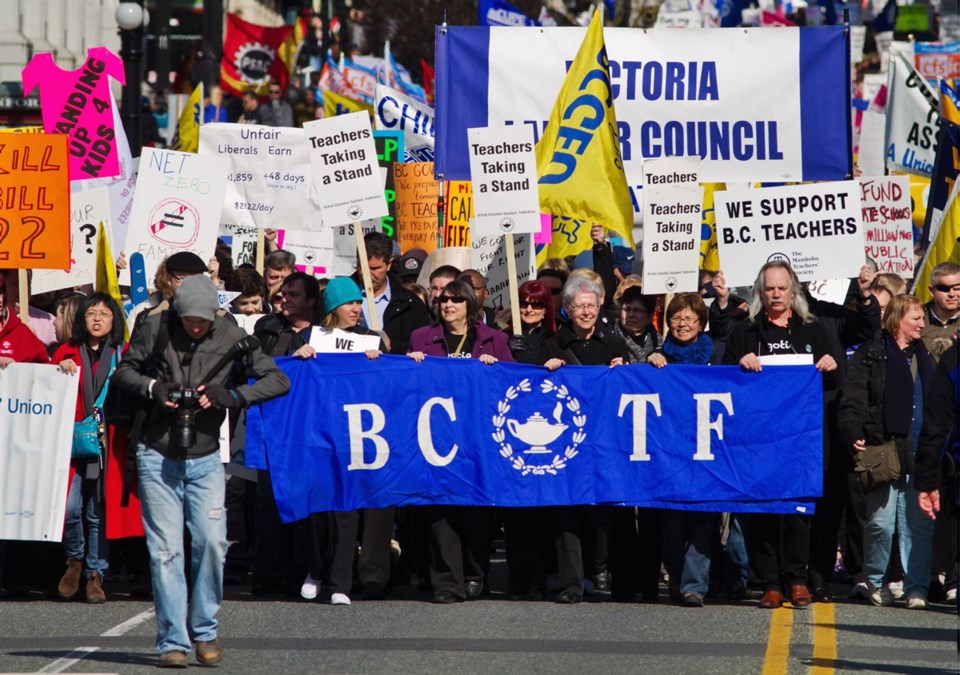As befits one of a certain age, I fell asleep well before midnight on Dec. 31, and almost immediately descended into a deep, dream-filled slumber.
The dream that followed had brought me forward to December 2020, reviewing the changes the new year had brought to B.C.’s public education system, changes that brought many aspects of public education into that kind of ideal educational world so favoured by us dreamers.
Government, for example, had finally realized that the past 30 years of B.C.’s “school wars” had accomplished little with multiple walkouts, lockouts, strikes and shutdowns.
A 2020 summit meeting of representatives from government, the B.C. Teachers’ Federation, school trustees, superintendents, principals, inside and outside workers and parent groups had concluded that existing dispute mechanisms had failed dismally, and, as its first mandate, the summit agreed and committed to the notion that despite inevitable contact disagreements, schools would remain open with kids in classes and that kids would never be sent home because the adults couldn’t compromise because uninterrupted education for our kids was far more important than scoring political points over contract disputes.
My dream revealed that government, aware that even the most successful businesses need to persuade consumers that the product is desirable, had created a separate Ministry of Education department that highlighted individual, school and school-district success stories.
Given that property owners in B.C. have no choice about paying for public education, government now was providing regular evidence from school districts and individual schools that what taxpayers had paid for was successful and well worthwhile.
The B.C. School Trustees Association, normally a fractious group, had become concerned about the news that while the Prince Edward Island government had reluctantly reinstated elected school boards for English-language schools, some provinces continued to cast a jaundiced eye at the role of boards of education.
BCSTA, conscious of the many disparate agendas within its ranks, now encouraged boards to focus not on small “p” and large “P” politics, but instead to promote progressive initiatives in education.
Predictably, my dream, like most dreams, included thoughts about teaching and learning. Aware that teacher excellence is the single identifiable factor that fosters student progress, my dream drifted into the possibilities of an innovative approach to teacher preparation that would follow teachers into their first year of practice, as with most other professions.
“Consulting teachers,” experienced educators at all levels, would be funded to mentor and guide first-year teachers through their first year of classroom practice with frequent, informal classroom observations.
There would be as many as six evaluations throughout the year before a final qualification was issued.
In the same way, my dream saw expanded and classroom-oriented instructional leadership programs for aspiring school based and district administrators.
These opportunities focussed on how to promote excellence in teaching and learning and would be a requirement for any teacher considering applying to a school-based or district-based leadership position.
Most dreams include some kind of music, and my dream was no exception, finding that the role of music and performing arts programs from K-12 had been upgraded in all schools.
Playing music, researchers tell us, has surprising benefits not only for learning language, but also for improving memory and focusing attention.
Similarly, 2020 had seen the oft-maligned role of counselling services in public schools significantly enhanced based on a report from the Canadian Mental Health Association that up to 20 per cent — or one in five — of young Canadians in 2019 are affected by a whole slew of mental-health disorders that must somehow be accommodated in classrooms where teachers work with kids every day.
As my dream for 2020 became diffused by morning light, I thought I heard, somewhere in the distance, students chatting about how the addition of a student self-evaluation component had now been included alongside traditional standardized testing measures of student progress and how this new component helped them “own” their own learning, teaching them to identify their own skill gaps and to see where to focus their attention as they progressed.
Finally, just before waking, I saw numbers — budget numbers and big ones — but numbers that proved public education was finally following the lead of business, trade and commerce in the matter of suitably adapting their environments to the full inclusion into everyday life, work, social interaction and learning possibilities for people with special needs.
No place in reality for dreamers, you say? As Brazilian novelist Paulo Coehlo wrote: “When a person really desires something, all the universe conspires to help that person to realize his dream.”
Geoff Johnson is a former superintendent of schools.



